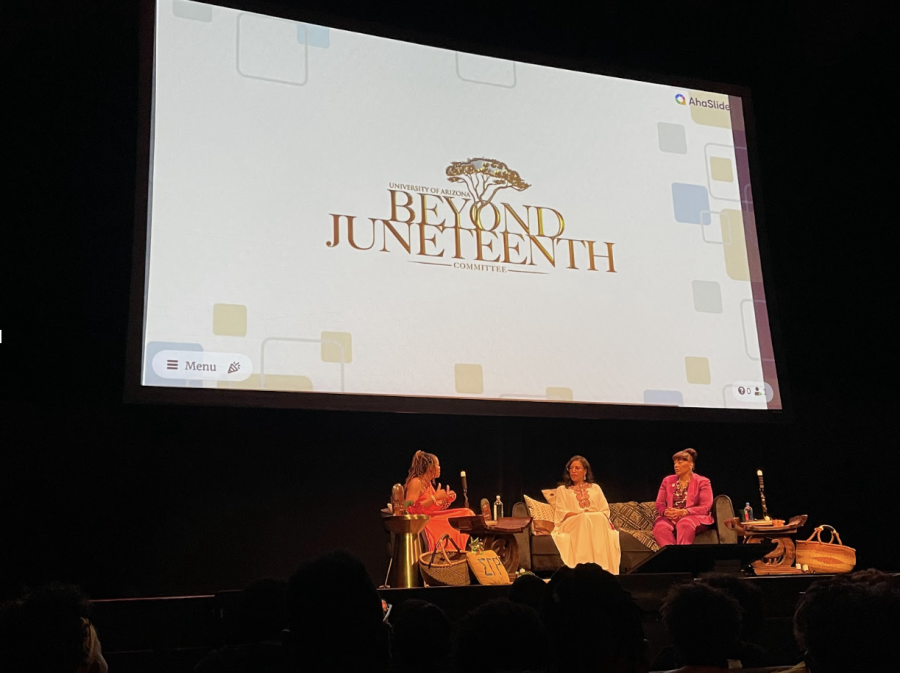Beyond legacy: A Juneteenth celebration brings Bernice King and prof. Ilyasah Shabazz to the University of Arizona
Denise TrimbleSmith (left) talks with Ilyasah Shabazz (middle) and Bernice King (right) about the meaning of Juneteenth and legacy at Centennial Hall at the University of Arizona, Monday, June 19.
June 20, 2023
Bernice King, daughter of Dr. Martin Luther King Jr. and Coretta Scott King, and Ilyasah Shabazz, daughter of Malcolm X and Betty Shabazz, visited the University of Arizona on Juneteenth, Monday, June 19, as a part of the Beyond Juneteenth committee’s capstone event, Beyond Legacy: A Juneteenth Celebration.
Centennial Hall was packed with students, faculty and community members. Denise TrimbleSmith, the director of justice initiatives at the UA, moderated the fireside chat with King and Shabazz, asking questions relating to Juneteenth, legacies and women in society.
When asked about legacies, King and Shabazz did not hesitate to talk about their mothers. In the devastation of their husbands’ assassinations, Coretta Scott King and Betty Shabazz continued to raise their families while carrying on their husbands’ legacies.
“I don’t know of any man in this world who has a legacy that a woman is not responsible for,” King said.
Shabazz noted that her mother “never gave in to bitterness or despair,” but rather passed on a legacy of forgiveness and love.
“When you educate a boy or a young man, you educate a community, but when you educate a woman or a young girl, you raise a nation,” said Shabazz as she talked about the importance of women in society.
Next, they discussed the meaning of Juneteenth.
“To me, it’s a significant day,” King said. “It’s a significant moment in the life of descendants of enslaved people. And there’s a lot of work to do to ensure that we who have descended from enslaved people are treated fairly, ethically — and, as my father said, ‘if you’ve done something against the people for hundreds of years, you have to do something for them.’”
King also noted that this holiday serves as a reminder of all of the things American society must unlearn in order to make structural changes.
“It’s about learning the true history, which there’s a lot there,” she said. “There’s a lot of unlearning that needs to take place as well. To commit to eradicating racism. To commit to eradicating the structures and systems of white supremacy that are barriers to Black equality and equity, and ultimately freedom. And finally, for me it represents our effort and struggle to really — I hope one day — get real reparations.”
UA law student Jocelyn Garcia reminded the crowed in attendance that it’s not just another day off, and that next year everyone should be more intentional and spend the day acting on that sentiment.
This event was organized by the Beyond Juneteenth committee. To learn more about Juneteenth and the Beyond Juneteenth initiative, go to beyondjuneteenth.arizona.edu.
Follow the Daily Wildcat on Twitter




